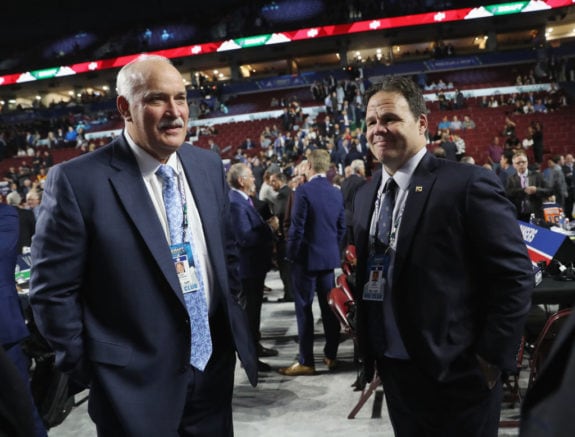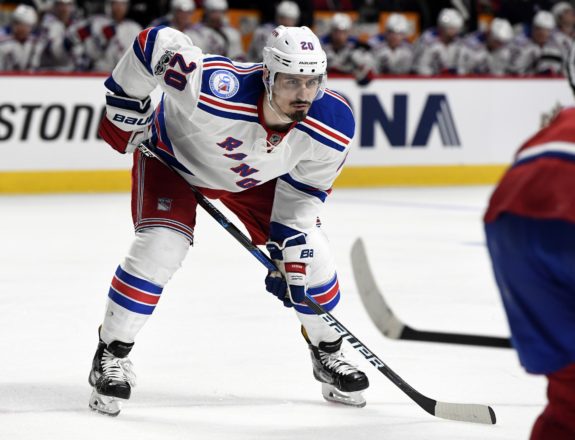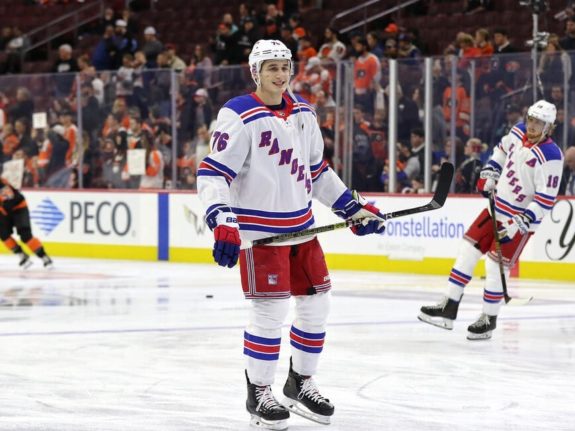When entering the trade deadline, the New York Rangers were expected to continue a trend that started when the rebuild was announced — selling everything in sight by 3 P.M. ET on deadline day. The club was slated to trade unrestricted free agents such as Chris Kreider and Jesper Fast while RFAs such as Alexandar Georgiev, Tony DeAngelo, Ryan Strome or Brendan Lemieux were all unlikely, but still potential departures.

Yet, the 3 P.M. deadline passed with each of those players remaining in New York, including one who’s essentially been guaranteed as a Ranger for life. Their decisions, while puzzling at first, showcase the front office’s dedication and trust in the current roster to deliver New York back to success.
Current Team Is Built for Success
General manager Jeff Gorton and team president John Davidson weighed their options at the deadline and decided to bet on themselves rather than test the market for trades. The seven-year, $45.5 million contract awarded to Kreider exemplifies their belief in their current roster and success through internal additions. The 28-year-old power forward could have been traded for quite a haul of future assets, but there was no guarantee it’d match the value they’d be trading away. The Rangers are unlikely to find a player of Kreider’s caliber at $6.5 million AAV on the free-agent market.

Regression is due as the contract will carry him to 35 years old. Not many power forwards are capable of maintaining elite play past their 30s unless their name is Alexander Ovechkin. Gorton and Davidson negotiated the extension, not because Kreider is expected to perform at a high rate for the entirety of the contract, but so he could help bring the organization back to contender status in the next three to five years.
The same strategy was used when committing to Jacob Trouba and Artemi Panarin to their multi-year, multi-million dollar contracts. Gorton and Davidson are building a team that’s built for success in the near future, not one that’s still gathering assets for a rebuild. Their most recent moves are indicative of that trust in their current roster, from the young developing rookies to the long-time veterans in Henrik Lundqvist or Marc Staal.
Positional Need Outweighed Market Value
After the Kreider question mark was promptly answered with a hefty extension, attention turned to the Rangers second-most touted trade piece. As a 28-year-old winger who’s never eclipsed 40-points in his career, Fast was the ideal candidate for a cap-stricken contender that needed depth on the wing.

Trades for Wayne Simmonds, Nate Thompson and Derek Grant suggested that the market for a player of Fast’s pedigree was present, but the returns were lower than expected value, floating around a fourth or fifth-round selection. Even a seasoned veteran like Patrick Marleau was enough to only produce a return of as third-round selection from the Pittsburgh Penguins. It was rumored that the Rangers were looking for a second-round pick for Fast.
Considering the disappointing market for depth forwards, the Rangers front office vied towards retaining Fast and pushing the decision on his future to the summer. Considering the Rangers’ lack of wing depth, particularly on the right side, Fast will be an integral portion to their final push for the playoffs. His veteran and positional value to a young roster outweighed the need for another third or fourth-round selection. This is particularly true since Gorton had another trade cooking as the deadline approached.
The Rangers are chock-full with young left-handed defensemen. Ryan Lindgren has led the charge with his explosive 2019-20 campaign, not to mention DeAngelo’s potential switch to his off-side. They’ll be eventually backed up by some combination of K’Andre Miller, Yegor Rykov, Libor Hajek, Matthew Robertson, Nico Gross, Zachary Jones or Tarmo Reunanen.

Brady Skjei’s clear regression from his former self and the Rangers quickly developing LHD prospects left his $5.25 million AAV as a worrisome salary cap anchor. Despite being just 25-years-old, Skjei’s value had quickly diminished and Gorton had a chance to shed a contract for a first-round selection in a particularly strong draft.
As a cheap right-winger who can play up and down lineup, Fast was in a position that the Rangers were in an immediate need of, whereas Skjei’s value had shifted towards a replaceable asset that could be found either internally through prospects or externally via depth signings.
The Rangers’ front office shifted the narrative that they created when the infamous rebuild letter was sent to fans over two years ago. They might not necessarily be competing for a Stanley Cup this year or the next, but their most recent deadline decisions suggest that the days of trading away captains and fan favorites are long gone.
Get the latest New York Rangers news, rumors, commentary and analysis